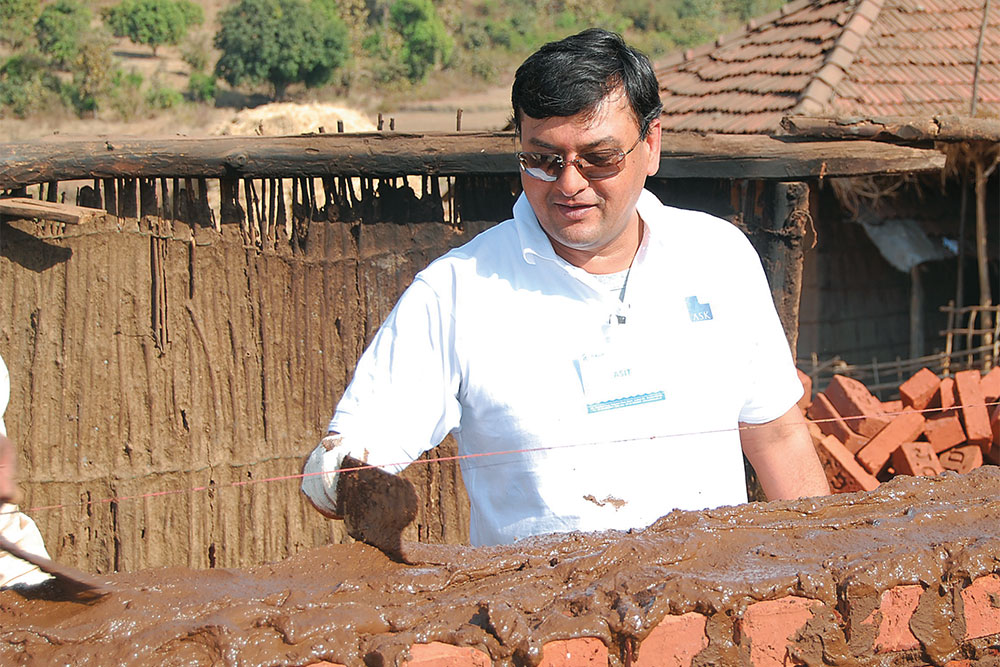Asit Koticha is a man who doesn’t speak to the media too often. And his rare interviews are all about markets and finance. But question Koticha on social causes and the floodgates open willingly. “The need is humongous,” says Koticha, founder and chairman, ASK Group, when he is asked what draws him to the many causes he supports. “Wherever a rupee is spent, it creates social impact. Therefore, we are present in diverse areas: we work in education, in healthcare, in sports and in housing.”
In education, Koticha supports the Sunbeam schools in Mumbai, which reach out to over 1,000 slum kids and children of construction workers, mill workers and domestic helpers living in chawls, enabling them to compete with their privileged peers and aspire for careers beyond their circumstances. “We monitor their growth even after they have reached the level of higher education,” Koticha says. He has also been instrumental in building schools and primary healthcare centres in Saurashtra. More than 1,500 houses have been built for the poor and Koticha’s target is another 7,000-8,000 houses in the next few years. “We are also supporting what is called the OGQ — the Olympic Gold Quest for 100 gold medals for India by 2020,” adds the man who is chipping in for the Dhoni Foundation, too.
Another major project that has Koticha’s considerable commitment and interest is a new department of philosophy and a convention centre for Mumbai University, his alma mater. “We have committed ₹32 crore for Mumbai University,” he says. “Till now, we have not taken any money from outside. Going forward, we may do so as the cost of the convention centre is going to go up to ₹150-200 crore. We would like people to participate and give back to the university.”
Apart from ASK Foundation and the Asit Koticha Foundation, Koticha channels his funds and time through an organisation called Life in Rajkot, which is concerned with preventing maternal mortality. His considerable expertise in the markets and his understanding of how money flows impact his commitment to social service as well, especially so in two ways.
“One is the way in which we look at investments and estimate the returns that we can generate,” he says. “Just as if I am investing in one company and not investing in another company by looking at what return I can get, I choose one activity over another by determining its impact vis-à-vis what we are not doing. That helps us decide better. Secondly, we are able to assess the human resource potential of people working in the social service sector — their vision, calibre, their ability to execute. So, we apply the same principles as we do in investing. We believe social spending is also social investing.”
“I get a lot of hope and encouragement from this,” says Koticha, when asked if the magnitude of problems leads to despair. “I always remember the starfish story. You are walking by a beach and so many starfish are dying on it. A guy is picking them up one at a time and throwing them back into the water. Another guy tells him it’s not going to make any difference because so many of them are dying. His answer is that it’s going to make a hell of a lot of difference to the one starfish that made it back to the sea.”
Koticha’s brother and wife are fully involved in his efforts. Besides, “My daughter has recently completed her MBA and majored in social service,” says the proud father. “She’s also very keen and intends to make it her career. So, as a family, we are all involved. It would be great if we are able to take it forward like this.”
Somewhere in the next 10 years, Koticha says, “We want to take up a district. Right now, there are various NGOs doing different things. Somebody is building houses in one village; somebody else is building a school in another. If we can all work together, the impact will be much better and larger.”
ASK supports its employees in participating in its social service endeavours. “We go to villages along with our staff and their families. For example, if we are building houses for the poor, we actually lay the bricks with our own hands,” says the famously camera-shy Koticha.
“The degree of involvement depends on the individual,” he adds. “Different people may wish to do things in different ways. That’s up to them. I feel more inspired and fulfilled if I become involved directly. I recommend every person should try it. For me, personally, nothing less is good enough.”











